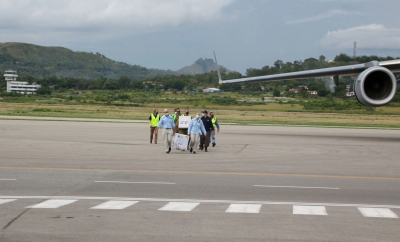This article was originally posted on Newsroom by Jo Cribb. Please see link here.

Development aid arriving at Port Moresby Airport in Papua New Guinea. Photo: Getty Images
Dame Jacinda Ardern called the world an “all out dumpster fire” in her Yale graduating class address expressing how many of us feel. With cancelled pay equity claims, cost of living pressures, images from Gaza, and statements from the White House, the world feels increasingly hostile.
The dumpster fire stepped up my urge to contribute in a positive and meaningful way. So much so that I applied to Volunteer Service Abroad for assignment.
For many of us the Pacific means escaping winter, golden sand beaches and colourful cocktails. Yet beyond the resorts, some of our close neighbours are developing nations, with intermittent access to electricity and health care systems none of us would be happy with.
Each year more than 150 Kiwis pack their bags and move to the Pacific with VSA. They give their time to work alongside their Pacific counterparts to support development efforts, for example upskilling in cybersecurity to protect the work of the Pacific Islands Forum Secretariat or training early childhood teachers in Timor-Leste or supporting staff at the Samoan Ministry of Agriculture to develop sector plans.
Kiwi volunteers are sought after. We have a reputation and track-record of rolling up our sleeves and working collegially with our Pacific counterparts. Maybe it’s our shared small island experience and the No 8 wire approach coming to the fore.
I’m soon to be joining the VSA workforce. In July and August, I will be based in New Britain, Papua New Guinea working alongside colleagues developing policy capability at the University of Natural Resources and Sustainability.
Though volunteer assignments for 12 months or more are preferred, VSA also has shorter and hybrid assignments. My assignment is blended. I have two months in-country to make connections and better understand the context before working virtually a few hours a week for the rest of the year.
Preparation has been thorough. Being accepted as a volunteer involved multiple screening interviews (including my husband and referees) and a full health and dental work-over. If things go wrong, I’ll be a long way from help. And then there’s the injections. I felt like a pin cushion for a few weeks.
In preparation, I’m snatching moments to learn pidgin phrases, read about Papua New Guinea (including some fabulous biographies), and talking with other volunteers.
VSA receives government funding, but the costs of assignments far exceed it. Each volunteer is asked to raise $1000 as a contribution to their assignment. I’ve taken a fun fundraising route: inviting a group of fabulous friends for dinner and charging them for the pleasure.
VSA’s measurement framework clearly shows the impact of its volunteers in supporting sustainable economic change. Partnerships with organisations such as Unicef, UN Women, and the Pacific Community as well as partnering with local organisations have been key to its approach and success.
Since 1962, VSA has been delivering locally driven improvements in essential community services throughout the world. In recent years, after the Government’s Pacific Reset in 2018, these efforts have focused closer to home: Timor-Leste, Papua New Guinea, Bougainville, Solomon Islands, Vanuatu, Samoa, Tonga, Fiji, Kiribati and Cook Islands.
And I’m proud to be joining their ranks.
This article was originally posted on Newsroom by Jo Cribb. Please see link here.
